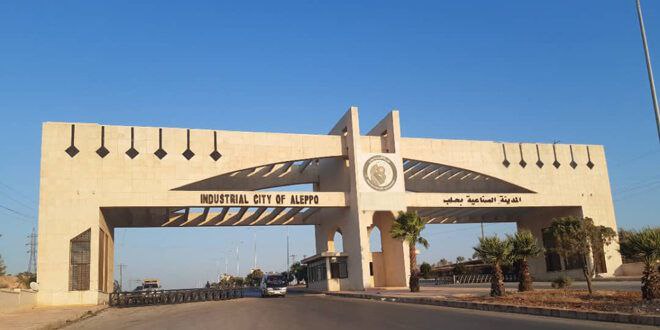Director of Sheikh Najjar Industrial City in Aleppo province : The production wheel is currently operating in 960 facilities.
Sheikh Najjar Industrial City in Aleppo Governorate is one of the key hubs supporting Syria’s industrial sector across various fields. Currently, the production wheel is turning in 960 operational facilities, while 100 other facilities are in the process of being equipped. Among the active facilities, there are 18 chemical plants, 160 food and engineering facilities, and 44 textile factories. Meanwhile, the number of allocated industrial plots has reached 4,670, with 1,357 still under construction.
The Director General of Sheikh Najjar Industrial City, Engineer Shahoud Abdul Aziz, told SANA that the Ministry of Economy and Foreign Trade, in cooperation with the administrations of industrial cities and zones, is keen on providing facilities to encourage investment in industrial cities. Work is underway to draft an investment regulation system that meets the needs and development of the industry.
Additionally, efforts have been made to reduce the financial and tax burdens in effect, provide legal, financial, and technical support and consultations for investors to benefit their projects, Regarding the expected investment volume in the city this year, Abdul Aziz revealed that it could reach at least 300%, driven by the increasing demand for land allocation and construction. Several industrialists have already begun restoring their facilities in the industrial city, preparing to restart operations in the coming months.
He noted that the largest share of currently operating industries in Sheikh Najjar Industrial City belongs to the textile sector.
The Director General described the city’s infrastructure as “deteriorating,” particularly in terms of the electrical network, substations, water pumping stations, rainwater and industrial wastewater drainage, as well as roads that require maintenance. Abdul Aziz pointed out that the meeting between Minister of Economy Basel Abdulhannan and industrialists in Sheikh Najjar Industrial City was productive.
During the discussion, they addressed the obstacles hindering production, including electricity prices and the need to align them with the rates adopted in neighboring countries while considering exchange rate fluctuations.
Rawaa Ghanam

